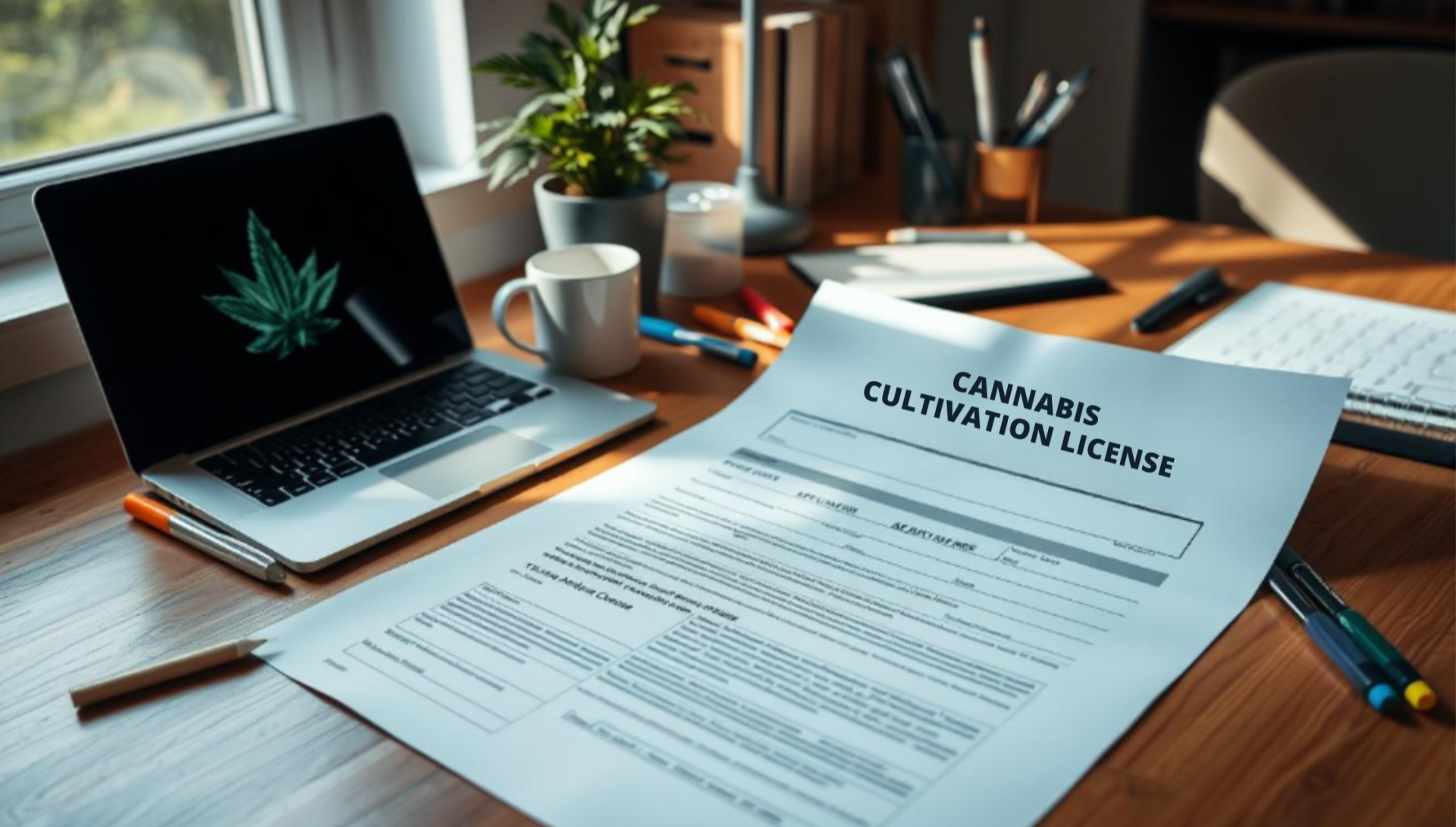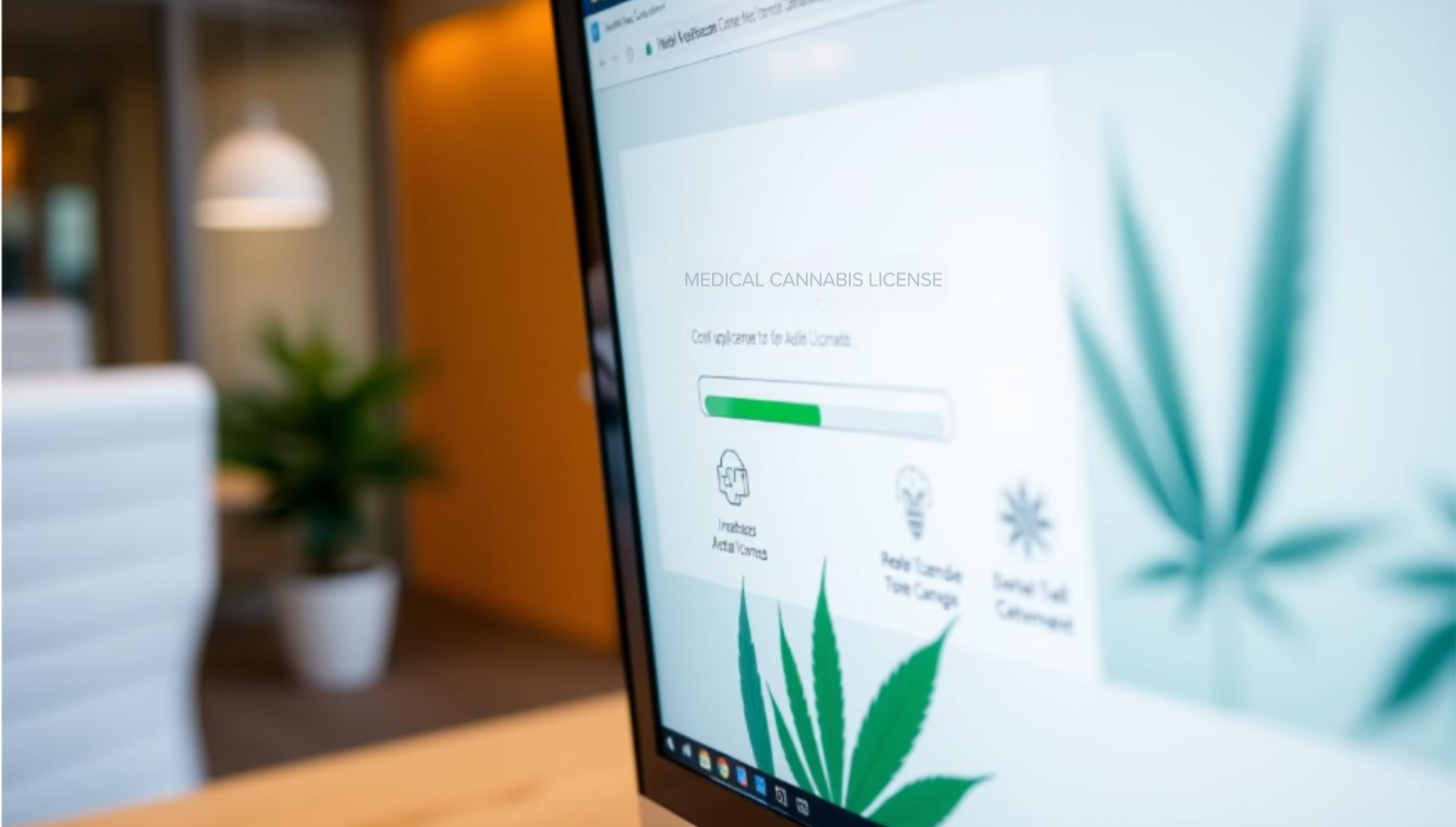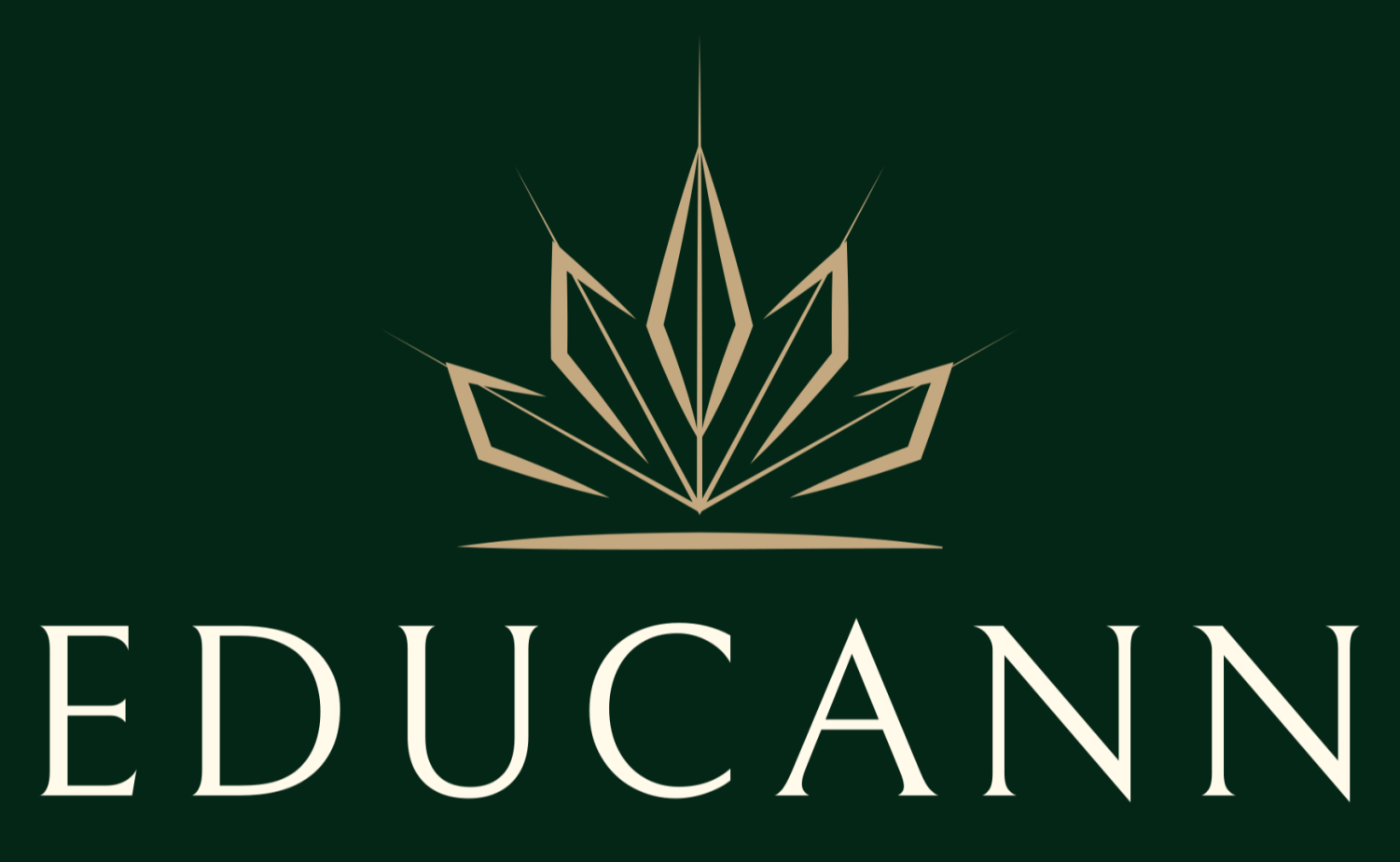Want to join the Canadian cannabis industry but unsure how to start? This guide is what you need to tackle the Health Canada cannabis license application. It's aimed for those into cultivation, product making, or medical sales. We'll guide you through each part of the application.

Key Takeaways:
- Familiarize yourself with the Cannabis Act and its regulations for a smoother license application process.
- Health Canada processes applications more efficiently when proper document naming conventions are followed.
- Micro-class license holders can meet security requirements proportionate to their risk profile without extensive equipment such as video recording systems.
- Preparation is key: gather necessary documents and information before starting your application.
- Contact Health Canada at licensing-cannabis-licences@hc-sc.gc.ca for specific licensing queries or 1-866-337-7705 for CTLS questions.
- Approximately 13 licenses per month have been issued since process improvements in May 2019, indicating an accelerated and efficient process.
To make sure your Health Canada cannabis license application succeeds, follow these steps closely. Resources and tools are here to help you. For help with your application, email us at: support@edu-cann.com.
Understanding the Health Canada Cannabis License
Getting a cannabis license in Canada means you have to understand Health Canada's rules. This part talks about the Cannabis Act, the various licenses, and why following the rules is key.
Overview of the Cannabis Act
The Cannabis Act is at the heart of Canada's Cannabis regulations. Its goal is to keep the public safe by setting strict rules for producing, selling, and using cannabis. It keeps youth under 18 from getting cannabis and limits adults to 30 grams. You can also grow up to four plants at home.
Types of Cannabis Licences
Health Canada offers different cannabis licensing options. These include cultivation, processing, and micro-class licenses, each with its own rules and conditions.
- Cultivation Licences: You need to provide detailed site information and follow specific guidelines.
- Processing Licences: These let businesses change cannabis into various products, under tight health and safety rules.
- Micro-Class Licences: These support smaller businesses with increased processing limits and harvest amounts.
- Nursery Licences: License holders can gather up to 20 kg of flowering heads.
Importance of Compliance
Following the rules of the Cannabis Act is a must. Health Canada uses a few ways to make sure everyone complies, like security checks and a tracking and licensing system. This keeps things in line with Health Canada's strict rules, making the licensing process smoother.
If you don't follow the rules, you could face big problems. This includes losing your license for not paying fees or missing important reports. To keep your license, you need to pass regular audits and inspections.
| Regulation Area | Key Requirement | Consequence for Non-Compliance |
|---|
| Youth Access | Under 18s can't access | Legal penalties |
| Possession Limits | 30 grams for adults | Fines and legal action |
| Home Cultivation | Only 4 plants per home | Fines and legal action |
| Site Evidence | Must have a fully built site | No license if you don't |
| CRA Licensing | Apply at the same time to CRA | Delays in starting operations |
| Security Clearance | Checks for criminal past and law enforcement record check (LERC) | Risk of license suspension or denial |
Need help applying for a license? Contact us at: support@edu-cann.com.
Types of Cannabis Licences Available
Health Canada offers a variety of marijuana licenses for the cannabis industry. These are for cultivation, processing, and medical sales. Each type follows strict rules for the safe and legal use of cannabis.
- Standard Cultivation: This type doesn't limit how much cannabis you can produce.
- Micro-Cultivation: Here, you're limited to growing on a maximum of 200m².
- Nursery Licence: This option limits you to 50m² for growing seeds.
There are two main types of processing cannabis licenses. They cover drying, trimming, extraction, packaging, and more.
- Standard Processing: You can make cannabis products with fewer limits.
- Micro-Processing: There's a cap. You cannot have over 600 kg of dried cannabis yearly.
Cannabis Sales for medical purpose: This license lets you sell to medical patients, other licensees, and researchers.
| Activity | Details |
|---|
| Analytical Testing | This allows handling cannabis to test its properties. |
| Research | It's for research with cannabis, which must be destroyed afterwards. |
| Importation and Exportation | For medical, scientific, or industrial reasons, it also covers transport. |
A single site can blend different licenses like micro and standard options for cultivation and processing, along with sales. Each one has its own application process and rules.
For help with marijuana licenses, cannabis cultivation, processing cannabis, or cannabis sales questions, email us at: support@edu-cann.com.
Preparing to Apply for a Cannabis License
Starting your journey to get a cannabis license in Canada means getting ready carefully. It's key to know that Health Canada's process is detailed and tough. This is to make sure only those who are truly prepared and lawful get licenses. Here's how to start:
Creating an Account in CTLS
To start your cannabis license process, make an account in the Cannabis Tracking and Licensing System (CTLS). CTLS registration lets applicants handle their profiles, send in applications, and keep track of their status. You'll need a valid business number from the Canada Revenue Agency and BCeID login info. Make sure all your info is correct to avoid any hold-ups.
Document Preparation
Getting your cannabis license documents ready is key. You'll need to send in a corporate profile for businesses, partnership details, or personal info for sole owners. Using the right document names as Health Canada wants is crucial for a smooth process:
- Proof of Business Registration
- Property Identification (PID) of the proposed site
- Financial information and banking details
- Consent for security screening
- Declaration of affiliations with federally licensed cannabis producers
Key Application Requirements
To apply smoothly, knowing and meeting the key requirements is necessary. Applicants need to meet several important criteria including:
- Payment of a $7,500 application fee for a cannabis retail store licence
- First-year licensing fee of $1,500 and annual renewal fee of $1,500
- Following security needs like alarm systems and secure storage
- Making sure all employees are 19 or older
- Telling local police, fire departments, and city hall
- Getting a preliminary OK based on requirements and local backing
Indigenous applicants can use a special two-stage review. This lets them start without a finished site. Also, fees for small-scale growing, nursery, and small processing licenses are lower.
Remember, you must follow the Cannabis Act, Excise Act, 2001, and local laws. This keeps your operation legal and effective.
For License application assistance contact us at: support@edu-cann.com
Step-by-Step Application Process
The application checklist for cannabis license needs you to be detailed and systematic. We offer a step-by-step guide to help you submit your cannabis license application smoothly.
Filling Out the Application
Start with the CTLS application guide to understand the required documents and information. You will need to provide details about your business, location, and main team members. Make sure you enter:
- Certificate of incorporation
- Business registration
- Site details and ownership consent forms
- Security plans and organizational charts
- Standard Operating Procedures (SOP) descriptions
- Record-keeping practices
- Information about identified individuals and key investor reports
Use the CTLS application guide for a complete application. Missing or incorrect information can slow down your application.
Submitting Your Information
Once all details are correctly filled, submit your application through the CTLS portal. Upload your documents correctly using the specified naming conventions. These include your License application ID and the document's creation date, to make the process smooth.
Then, ensure all necessary fees are paid. The security clearance cost is $1,654. Application screening fees vary by type:
- $3,277 for standard cultivation, processing, and sale for medical licenses
- $1,638 for micro-cultivation, micro-processing, and nursery licenses
You must send the visual evidence to Health Canada within 10 days of your CTLS application. Missing this deadline can stop your application.
Application Checklist
Follow this essential application checklist for cannabis license closely:
- Create a personal account in CTLS.
- Apply for security clearance.
- Upload all required documents, using the right names.
- Send the site evidence package within 10 days after your CTLS submission.
| License Type | Application Fee | Additional Requirements |
|---|
| Standard Cultivation | $3,277 | Security measures, attestation forms |
| Micro-Cultivation | $1,638 | Site ownership consent forms |
| Nursary Licenses | $1,638 | Record-keeping practices |
Following this checklist helps ensure your submission is complete and compliant. This makes the review process smoother and moves your application towards approval.
For help with your license application, contact us at: support@edu-cann.com.
Common Mistakes to Avoid During Application
When applying for a Health Canada cannabis license, it's crucial to know common mistakes. Getting the right license application guidance helps dodge errors when submitting. Here are some cannabis application tips to make your application go smoothly:
- Incomplete Documentation: Make sure you prepare and upload all needed documents. Missing any can cause delays or rejections.
- Ignoring Details: Focus on every small detail in the application. Small mistakes, like wrong addresses or missing info, can set you back.
- Improper Stakeholder Information: Ensure all stakeholders' details are correct and meet Health Canada's requirements.
- Skipping Pre-Consultation: A pre-consultation with Health Canada can give useful feedback and license application guidance. It addresses potential problems early.
- Overlooking Security Measures: It's vital to have and document a good security plan. This ensures you meet the Cannabis Act's rules.
- Lack of Financial Planning: Having a clear financial plan is very important. Be sure your financial statements and funding sources are well-explained.
To sum up, careful preparation and paying attention to detail can help avoid common mistakes. This will make applying easier. For more help, cannabis application tips, and advice, don't hesitate to reach out at support@edu-cann.com.
How to Track Your Application Status
After you've applied for a Health Canada cannabis license, keeping up with your application's status is key. Here’s how you can keep track using the tools and resources available.

Using the CTLS System
The Cannabis Tracking and Licensing System (CTLS) is where you check your cannabis application status. Once you submit your application, you will get updates on any status changes. For example, after Health Canada sends invoices for the license application-screening fee and security clearance fees, your CTLS status will show "Payment." This means it's time to pay these fees.
After you make the payment, the CTLS status will switch to "In progress." This shows that they've started the security clearance and license screening. Keep an eye on these updates to stay in the loop from payment to the final review. Remember to regularly check the CTLS site. This way, you can quickly provide any extra information Health Canada might ask for.
Contacting Health Canada
If CTLS doesn't answer your questions, contacting Health Canada directly could help. Always use your application ID when you reach out to get the right help. You can email or call Health Canada with any detailed questions about your application process.
If you run into issues or need more details, talking directly can often speed up solutions. Be sure to mention your application ID to make it easier to get help with your case. For more help with your license application, feel free to reach out to us at: support@edu-cann.com.
Post-Approval Requirements and Compliance
After you get your cannabis license, it's very important to follow Health Canada's rules carefully. You need to stick to what your license says and be ready for checks and audits. Doing this helps your business keep going strong.
Understanding Terms and Conditions
Knowing what the Cannabis Act says is key. Sections 17 to 24 are especially important. You can't promote cannabis in a way that's not true or tries to trick people. It's also not okay to link your cannabis brand with famous people in a way that might attract kids. This is banned in certain sections of the act.
- Section 18(1) and (2) prevent false or deceptive promotion.
- Section 20 prohibits using foreign media for promotion.
- Section 21 prohibits using brand elements in sponsorships.
- Section 22 prohibits displaying brand elements at sports/cultural events.
A guide from Health Canada, released on August 29, 2019, gives detailed info on what you need to do after getting approved. Following Good Production Practices (GPP) that are part of the Cannabis Regulations means you're meeting high-quality standards. This includes how you package and distribute your products.
Compliance Audits and Inspections
Health Canada makes sure you're following the Cannabis Act with audits and inspections after you get your license. These checks can lead to warnings, taking away your products, fines up to $1 million, or recalling your products if they don't meet standards. It's crucial to always check your business operations to make sure everything is up to standard.
| Compliance Measure | Description |
|---|
| Warnings | Initial notification for minor infractions. |
| Seizure | Confiscation of products not meeting standards. |
| Monetary Penalties | Fines up to $1 million for severe violations. |
| Product Recalls | Removal of non-compliant products from the market. |
If you have a cannabis license, it's important to stay up-to-date with all the rules and make sure you're always in compliance. This helps you avoid any penalties. If you need help or have questions, you can reach out to us at: support@edu-cann.com.
Resources and Tools for Application Assistance
Applying for a cannabis license can seem tough. But, many resources make it easier. They offer help and know-how to improve your journey.

Third-Party Licensing Assistance
Getting help from third-party consulting services can really help. They know a lot about licensing and can give you tips to succeed. Their personalized services make sure you meet all Health Canada's rules.
Helpful Guides and Checklists
You can find guides and checklists to help with your application. These come from places like Health Canada. They make sure you have all you need for your application.
| Institution | Resource | Description |
|---|
| University of Waterloo | List of Cannabis Resources | Includes YouTube videos, factsheets, and flashcards. |
| CAMH | Lower-Risk Cannabis Use Guidelines | Guidelines for promoting safer cannabis usage among youth. |
| Government of Ontario | Recreational Cannabis Information | Addresses mental health considerations for students. |
For personal assistance, get in touch at: support@edu-cann.com. Make the most of these resources and consulting services for a smooth application.
Cannabis Cultivation License: Specifics for Growers
Getting a cannabis growing license is vital for legal cannabis cultivation in Canada. It's important to know the cannabis cultivation guidelines, fees, and what you need to do. This makes sure you follow the rules and have a successful operation.
“For License application assistance contact us at: support@edu-cann.com.”
The Micro-Cultivation License (MCL) allows up to 200m² (2152 ft²) of cannabis canopy space. This helps manage the growth areas well. You'll need to pay $1,638 for the Application Screening Fee, $1,654 for each Security Clearance, and a $2,500 Annual Regulatory Fee. The total comes to $5,792.
Companies applying for an MCL need a main or branch office in Canada. All your directors and officers must be legal adults. You must give detailed information about your site, like its address, a site survey, and aerial views. Don't forget to describe both indoor and outdoor growing areas.
You also need to tell about your key staff. Names and roles of your Head of Security, Responsible Person, and Master Grower are needed. Everyone must have security clearances. You have to notify the local government, fire, and police about your activities. Also, provide detailed site location info.
Your security measures must be explained well in a physical security plan. List out the site's boundaries, building structures, outdoor areas, and safety features. It's also important to keep good records. This includes tracking inventory, communicating with authorities, and documenting everything from production to promotions.
After applying through the Cannabis Licensing Tracking System (CTLS), you get a License Application ID. This helps track your application. Later, you'll need to send a video walk-through of your site, facility photos, and maybe have a pre-license inspection by Health Canada.
Getting help from an experienced consultant is very useful, but it can be very pricey. This is where Educann is different, we provide expert advice at a low cost. We help with signing declarations about how much cannabis you'll have. This makes sure you're allowed to have, grow, test, and sell cannabis.
With a cultivation license, you can also dry, trim, and mill cannabis. The space for growing mustn't be over 200 m² for micro-cultivators. A nursery license also allows for owning, testing, and selling cannabis plants and seeds.
Every license holder needs a Master Grower. They might even appoint an alternate. This person is in charge of growing, propagating, and harvesting cannabis plants. They make sure everything complies with the cannabis cultivation guidelines and license needs.
Understanding these rules and guidelines well is key. It helps make the license application smooth. It ensures your cannabis growing follows all the necessary rules.
Conclusion
Getting a Health Canada cannabis license requires knowing a lot about Health Canada's cannabis rules. You need to understand the Cannabis Act and get your documents ready. Making sure you follow the rules every step of the way is key to getting your license.
It's important to use all the help you can find. This includes looking for outside help and using detailed guides. These tools make applying easier and boost your chances of success. By following the steps closely and avoiding mistakes, you can handle Health Canada's cannabis rules better.
In the end, Canada's growing cannabis industry offers many chances for those who are ready and informed. If you need extra help while applying for a cannabis license, you can reach us at support@edu-cann.com. Staying compliant and ready puts you in a great spot to make a big impact in Canada's expanding cannabis market.




